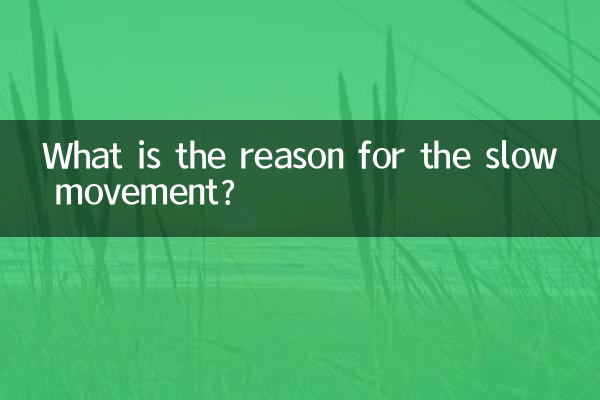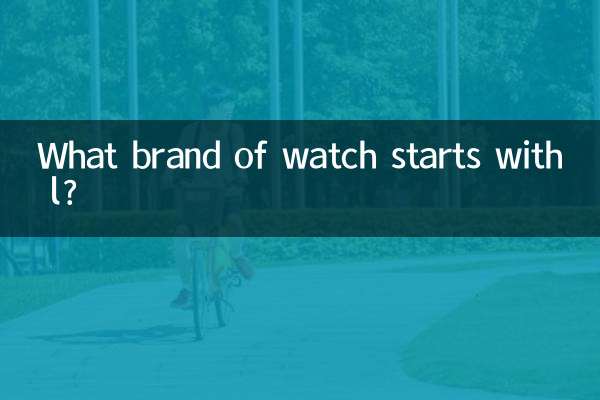What is the reason for the slow movement?
In modern society, many people often feel that they are slow and inefficient. This phenomenon may be caused by a variety of factors, including psychological, physiological and environmental aspects. This article will combine the hot topics and hot content on the Internet in the past 10 days, analyze the reasons for slow action, and provide structured data to help readers better understand this problem.
1. Psychological factors

Psychological factors are one of the main reasons for slow movement. The following are common psychological reasons:
| psychological factors | Specific performance | solution |
|---|---|---|
| procrastination | Tasks are delayed in starting and efficiency is low | Make clear plans and set deadlines |
| anxiety | Excessive worry about results leads to slow action | Relaxation techniques such as meditation and deep breathing |
| lack of motivation | Not interested in tasks and moves slowly | Look for intrinsic motivation or reward mechanisms |
2. Physiological factors
Physiological health also directly affects movement speed. The following are common physiological causes:
| physiological factors | Specific performance | solution |
|---|---|---|
| lack of sleep | Lack of energy and unresponsiveness | Guarantee 7-8 hours of high-quality sleep |
| Malnutrition | Lack of energy and slow movement | Eat a balanced diet with protein and vitamins |
| chronic disease | Decreased physical strength and limited movement | Seek medical treatment promptly and follow medical advice |
3. Environmental factors
The impact of the external environment on action efficiency cannot be ignored. The following are common environmental causes:
| environmental factors | Specific performance | solution |
|---|---|---|
| Cluttered work space | Distract attention and reduce efficiency | Organize regularly to keep the environment tidy |
| noise disturbance | Difficulty concentrating and moving slowly | Use noise-canceling headphones or find a quiet environment |
| multitasking | Distracted attention, slow task completion | Focus on a single task and avoid multitasking |
4. Analysis of hot topics on social media
According to the analysis of the entire network data in the past 10 days, popular discussions about "low efficiency" and "slow action" mainly focus on the following aspects:
| hot topics | Discussion popularity | Main point |
|---|---|---|
| Information overload in the digital age | high | Too much information input leads to distraction |
| Remote work efficiency issues | in | Lack of supervision and reduced efficiency when working from home |
| Procrastination is common among young people | high | Time spent on social media is inversely proportional to productivity |
| Sleep quality and work efficiency | in | Lack of sleep becomes the primary factor affecting efficiency |
5. Practical Suggestions for Improving Slow Action
Based on the above analysis, we have compiled the following practical suggestions for improving slow action:
1.Establish a regular routine: Fixed work and rest time helps improve the stability of the biological clock, thereby improving the efficiency of daily actions.
2.Task prioritization: Use the four-quadrant rule (important/urgent) to clarify task priorities and avoid wasting time on unimportant tasks.
3.Set clear goals: Break down big goals into small goals. Each time you complete a small goal, you can gain a sense of accomplishment and stay motivated.
4.moderate exercise: Regular aerobic exercise can improve blood circulation and increase oxygen supply to the brain, thereby enhancing reaction speed.
5.digital detox: Stay away from electronic devices regularly to reduce information input and allow your brain to fully rest.
6.Environmental optimization:Create a focused work environment, eliminate distractions, and improve work efficiency.
7.psychological adjustment: Learn techniques such as mindfulness meditation to improve concentration and reduce slowness caused by anxiety.
Conclusion
Slow movement is the result of a combination of factors. By identifying specific causes and taking targeted measures, most people can significantly improve their effectiveness. It's important to note that improving speed of action is a gradual process that requires ongoing effort and adjustments. I hope the analysis and suggestions in this article can help readers find solutions that suit them and improve the efficiency of their lives and work.

check the details

check the details